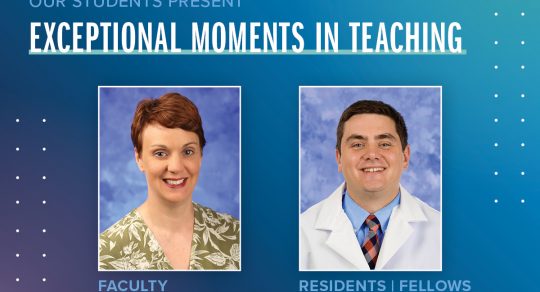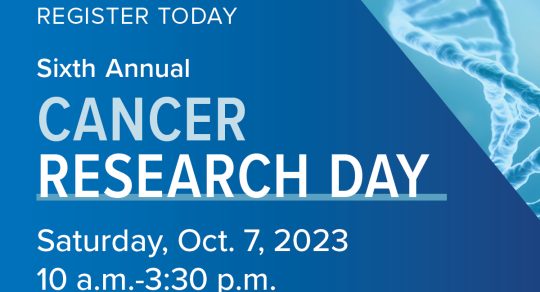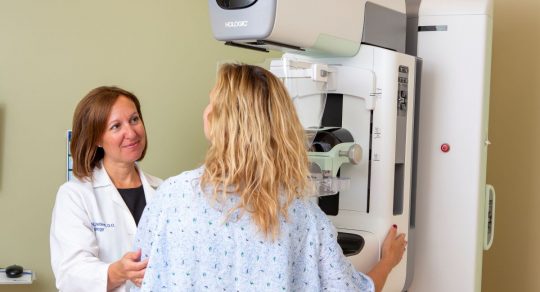Fellowship
Hematology/Oncology
The Hematology/Oncology Fellowship is a three-year, ACGME-accredited program that admits four fellows per year and serves Penn State Health Milton S. Hershey Medical Center and Penn State Cancer Institute.
Explore More
The combined three-year program will prepare the trainee for obtaining board certification in both Hematology and Oncology through comprehensive and robust clinical education in hematology/oncology, consisting of regular didactic lecture series as well as tumor board, Journal Club and Grand Rounds presentations, and a curriculum that is tailored to the trainees’ professional interests, whether this focuses on an academic career in research, medical education and/or clinical care or a career focused on community hematology-oncology.

Program Overview
To be a candidate for this ACGME-approved training position, the qualified candidate will be completing (or already has completed) a three-year ACGME-accredited internal medicine residency. It is expected that the candidate be board-eligible for internal medicine by the start of the training program.
2026 Recruitment Season
Update: Applications have been received and are currently under review.
Signaling: While we preferentially consider applications from those who signal our program, we also consider applicants who do not signal us.
Program Aims
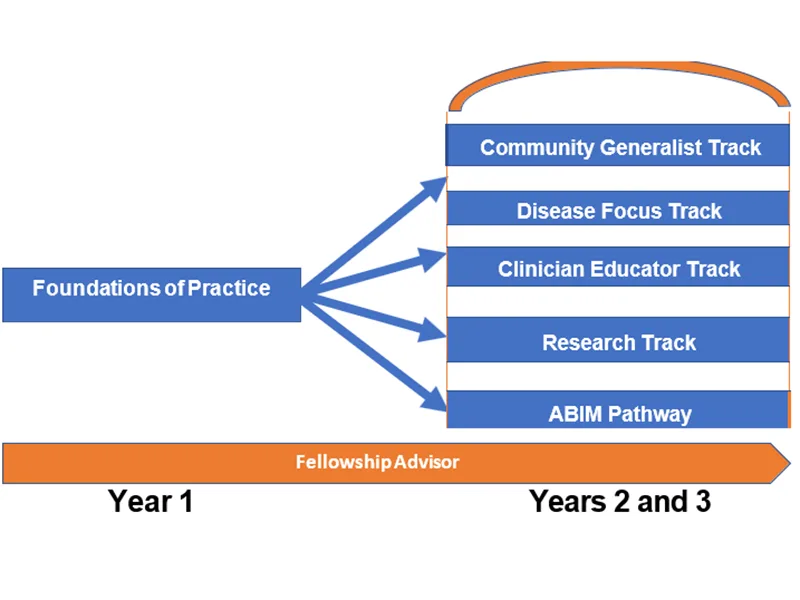
Training Timeline and Tracks
The first 18 months of training are dedicated to foundations of practice through inpatient consult and outpatient clinical experiences. The second 18 months are individualized based on career goals with curriculum guided by noncompetitive tracks:
Generalist Track: Ideal for those interested in community-based practice
Disease Focus Track: Ideal for those interested in academic medicine with a clinical research interest
Clinician Educator Track: Ideal for those interested in academic medicine with a clinical education interest
Research Track: Ideal for those interested in academic medicine with a lab or translational-based research
ABIM Pathway: Ideal for those interested in academic medicine with a lab or translational-based research uniquely offered in the Department of Medicine
Program Highlights
Varied experience
University academic hospital – 90 to 100% of time spent at university hospital
Affiliated VA hospital
Community-based elective at affiliated sites
Individualized training that is customized per fellow professional goals
Stem cell transplant program (allogeneic, autologous and CAR-T therapy)
Hemophilia and Thrombosis Center of Central Pennsylvania
Sickle cell clinic
Cancer genetics program
Health population sciences
Cooperative group affiliation
Opportunity to participate in basic science, laboratory research or clinical trial
Dedicated Cancer Institute Clinical Trials Office: Big Ten network, ACRIN, ECOG, NSABP, RTOG, pharmaceutical industry trials
Clinical rotations
Palliative care medicine
Pediatric hematology/oncology
Radiation oncology
Learn More about the Fellowship
General Application Information
The Hematology/Oncology Fellowship participates in the National Residency Matching Program (NRMP), and all applications are submitted through ERAS, the Electronic Residency Application Service.
Application Requirements: Hematology/Oncology Fellowship
Possess an MD or DO degree
Be a U.S. citizen, non-citizen national, permanent resident or holder of a J-1 training visa per institutional policies
Have successfully completed an ACGME-accredited internal medicine residency training program
Application Requirements: Hematology Track
Possess an MD or DO degree, or a doctoral degree in a related discipline
Be a U.S. citizen, non-citizen national, permanent resident or holder of a J-1 training visa per institutional policies
Have successfully completed an ACGME-accredited internal medicine residency training program
Have a commitment to a career focused on benign hematology, with a specific interest in hemostasis and thrombosis
What to Submit
Applicants will need to submit the following information through ERAS:
ERAS application
CV
Three letters of recommendation (one from the residency program director)
Medical school transcript
USMLE scores
Personal statement
The core faculty in the Hematology/Oncology Fellowship and the Hematology Track are full-time academic physicians committed to patient care, teaching and laboratory and clinical research.
Many allied faculty at Penn State Health Milton S. Hershey Medical Center and affiliated institutions participate in training the fellows.
Faculty research interests include endocrine oncology, transplant immunology, LGL leukemia, bleeding and clotting disorders, bone metastases, tumor biology and population science.
Leadership

Assistant Dean for Education in the Clinical Learning Environment, Penn State College of Medicine



Program Coordinator, Endocrinology, Diabetes and Metabolism Fellowship, Hematology/Oncology Fellowship and Interventional Pulmonology Fellowship, Medicine
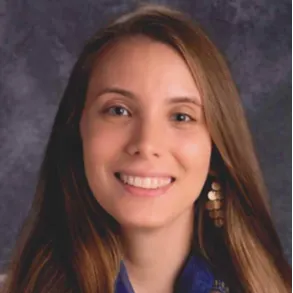
Program Admin, Hematology/Oncology Fellowship
Supporting Your Training
Curriculum Details
Sections involved in the Hematology/Oncology Fellowship include:
Continuity clinic with individualized cohort of patients for different disease types
Outpatient clinic rotations
Hematology consultation service
Oncology consultation service
Inpatient hematology/oncology team
Hematology lab/blood bank
Gynecologic oncology and genetics
Lebanon VA Hospital
Community practice elective at affiliated sites
Palliative care
Radiation oncology therapy
Stem cell transplant
Research
The Quality Oncology Practice Initiative (QOPI) is a twice-a-year chart review that serves as the ACGME-required Practice-Based Learning improvement project. Learn more about QOPI here.
Didactic learning includes the following:
Cancer Institute Interdisciplinary Conference
Hematology/Oncology Grand Rounds
Medicine Grand Rounds
Fellows’ noon conferences are held Monday-Friday on the following topics:
High-yield disease based management topics by Heme/Onc Faculty
Biostatistics
Fellow Journal Club
Ethics and communications
Genetics
Pharmacology
Board reviews
Peripheral slide series
Fellow Tumor Board
Hematology Case Conference
Benign Hematology Conference series
Fellow feedback sessions
Tumor-specific conferences
Brain tumor
Breast
Gastrointestinal foregut tumor conference
Gastrointestinal conference
Genitourinary
Head and neck
Melanoma and cutaneous malignancies
Sarcoma
Thoracic
Malignant hematology
Benign hematology
Gynecologic
Evaluations of the fellows will be completed using the following methods:
Monthly rotational evaluations
Individual semi-annual reviews
Multisource (360-degree) evaluations
Self-assessments
Systematic annual program review
Each fellow must attend a conference for bone marrow biopsy training.
Each fellow must complete five supervised marrows with either an experienced APP or senior fellow with satisfactory sampling. Each fellow will be assigned to an experienced APP team or senior fellow to complete five supervised marrows in their first month of fellowship
After completion of five supervised marrows, each fellow must arrange to have one witnessed bone marrow biopsy by the program director or associate program director or other approved hematology attending with satisfactory sampling. Attending will “sign off” on fellow’s ability to perform marrows on their own.
Fellow Honors and Recognitions
Penn State College of Medicine and Penn State Health Milton S. Hershey Medical Center accept ongoing nominations for the Exceptional Moments in Teaching award.
The award, given monthly by the Office for a Respectful Learning Environment, accepts nominations from College of Medicine students who are invited to submit narratives about faculty members, residents, fellows, nurses or any other educators who challenge them and provide an exceptional learning experience. See more about the award here.
Previous nominees from the Hematology/Oncology Fellowship are listed here.
Contact Information
Mailing Address
Penn State Health Milton S. Hershey Medical Center
Division of Hematology/Oncology
500 University Dr., Mailcode CH46
Hershey, PA 17033-0850
